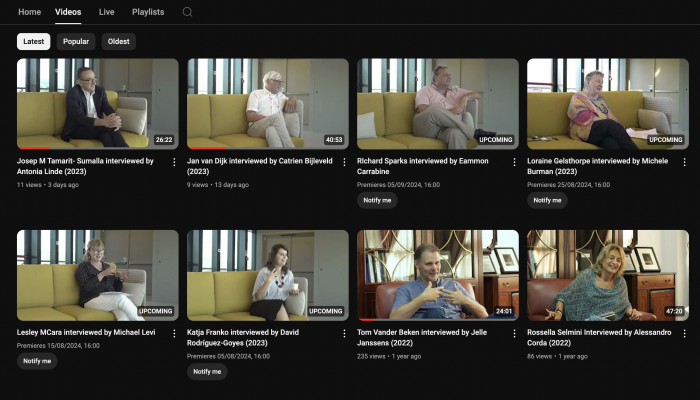The ESC European Criminology Oral History project (ECOH)

Despite many challenges, European Criminology has developed fast in the last decades and is growing unabated. There are now several generations of European criminologists, and many different working groups and networks. One of the conspicuous signs of this momentum is the role played by the ESC since the early 2000s, which has been consolidated as the most important scientific community for scholars working on crime and the criminal justice system. It is therefore time to tell the story of this academic development through the voices of the scholars who played a role in this process, conducting research in different corners of Europe.
For these purposes, the ESC launched the European Criminology Oral History project (ECOH) in 2015. Inspired by the American Society of Criminology’s Oral History of Criminology Project, which was initiated in the mid-1990s, the ECOH project is aimed at creating an organised collection of recorded interviews to be used for archiving, dissemination, research and teaching purposes. From 2015 to 2018, the project was led by Rossella Selmini (University of Bologna), assisted by Marco Calaresu (University of Sassari). Since 2019, it has been run by José A. Brandariz (University of A Coruna), initially assisted by Silvia Rodríguez-López (University of A Coruna) and later, from 2023, by Ignacio González-Sánchez (University of Girona). The new interviews are regularly uploaded on YouTube and announced in the ESC blog.
Narrating the story of the gradual consolidation of European criminology is arguably not an easy task. Institutional conditions differ significantly cross-nationally and there are notable differences in methodologies, theories, and even forms of engagement with non-academic and policymaking actors. This remarkable diversity creates specific challenges for the inclusion of underrepresented academic communities. To overcome this potential shortcoming, the ECOH project has put significant effort into defining the criteria for selecting interviewees. Specifically, and up to this moment, three main groups of academics have been given preference:
- the founders of the ESC: Bijleveld, Bruinsma, Killias, Levi, Savona, Snacken, Tonry, Wikstrom;
- former ESC presidents: Dobryninas, Dünkel, Krajewski, Larrauri, Lévay, McAra, Meško, Selmini, Tamarit, van der Beken; and
- recipients of the ESC European Criminology Award: Gelsthorpe, Hough, Karstedt, Melossi, van Dijk, Walgrave.
Beyond these three main groups, the ECOH project also interviewed other scholars who have played a pivotal role in the development of criminology in Europe: Birkbeck, Burianek, Díez-Ripollés, Fijnaut, Gilinsky, Hope, Lösel, Marshall, Nelken, Ponsaers, Roché, Shapland, Sparks. To avoid potential gaps, the project is recently putting the spotlight as well on top scholars based in countries in which criminology is garnering increasing traction despite its recent development as a proper academic field: Franko; and Kivivuori, O’Donnell and Svensson in 2024. The comments of these critical scholars cast light on how European criminology has evolved to become what it is today, a thriving and vibrant academic field that is increasingly spreading continent-wide.
